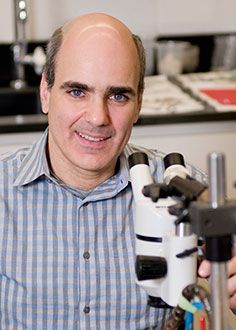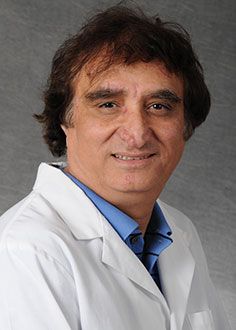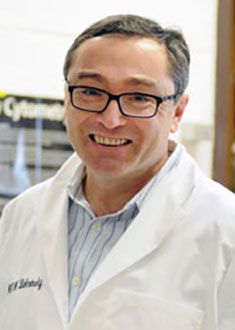In August, The George Washington University (GW) School of Medicine and Health Sciences (SMHS) received three federally funded research project grants (R01s) and one federally funded cooperative agreement research project grant (U01). These National Institutes of Health (NIH) grants will allow SMHS faculty members Jeremy Brown, M.D.; Anthony-Samuel LaMantia, M.D.; Imtiaz A. Khan, M.D.; and Michael I. Bukrinsky, M.D., advance research into topics ranging from the treatment of kidney stones, to the development of brain disorders in children, the immune system response to infection in human immunodeficiency virus (HIV) patients, and cardiovascular disease in HIV patients. While these grants total more than $6 million, the far-reaching effects of this research may help more than 30 million patients in the United States alone.
Grant funds kidney stone research by Brown

According to a recent study, in the United States one in 10 men and one in 14 women have had a kidney stone. Unless the kidney stone is too large to pass on its own, the treatment prescribed is usually plenty of fluids and pain killers while letting it pass over a period of several days. Through his four-year, $4,198,046 grant, Jeremy Brown, M.D., associate professor of emergency medicine, will be exploring a new way to treat kidney stones. His research project “Multi-Center Study of Tamsulosin for Ureteral Stones in the Emergency Department,” will enroll patients with kidney stones in three emergency departments (ED), including the ED at GW, and randomize them to an active medication called Tamsulosin, or a placebo. Brown believes treatment with Tamsulosin will help patients pass their kidney stones faster and with fewer complications.
Brown’s research is supported by the NIH and the National Institute of Diabetes and Digestive and Kidney Diseases, and follows a small-scale study that was successfully completed at GW and funded by the NIH.
LaMantia uses grant to further study of brain disorders

For the past nine years Anthony-Samuel LaMantia, M.D., professor of pharmacology and physiology has been investigating how behavioral disorders such as schizophrenia, autism, and attention deficit hyperactivity disorder (ADHD) arise during early brain development. This month’s latest installment of his 10-year RO1 grant from the NIH and the Eunice Kennedy Shriver National Institute of Child Health & Human Development for his project, titled “Regulation of 22q11 Genes in Embryonic and Adult Forebrain,” will allow him to further his exploration into pre-frontal cortex and what he calls disorders of cortical connectivity.
Using animal models, LaMantia will study whether genetic mutations during the early development of the forebrain, the part of the brain that mediates learning, memory, language and social interaction, create vulnerability for autism, schizophrenia and related disorders. He hopes that by discovering more about these mutations, more specific physiological interventions may be developed to adjust deficiencies of those living with schizophrenia, autism, ADHD, and other behavioral disorders.
Khan to examine infections in HIV patients with federal grant

Imtiaz A. Khan, M.D., professor of microbiology, immunology, and tropical medicine, received a federal grant from the NIH and the National Institute of Allergy and Infectious Diseases to study the effects of microsporidia—opportunistic inter-cellular pathogens—that cause morbidity and mortality in HIV patients.
His project, titled “CD8+ T cell effectors against microsporidia,” will study how to prevent microsporidia from causing complications in immuno-compromised subjects by regulating CD8+ T cells. Khan hopes to use his grant to find a way to detect agents that will generate an immune response against these pathogens, improving the mortality and quality of life of many HIV patients.
Bukrinsky receives funding to research cardiosvascular disease in HIV patients

Cardiovascular disease has recently become a major clinical problem in HIV patients. Many believe this is due to the adverse effects of pro-longed use of toxic anti-HIV drugs. Michael I. Bukrinsky, M.D., Ph.D., professor of microbiology, immunology, and tropical medicine and professor of biochemistry and molecular biology, believes that while drugs may contribute to this problem, HIV infection itself may also be a significant factor.
Bukrinsky received a supplemental grant this month from the NIH and the National Heart, Lung, and Blood Institute to continue his third year studying cardiovascular disease in patients infected with HIV. With this grant, Bukrinsky studies the effect of HIV infection on high-density lipoprotein, in hopes of finding a way to target and treat cardiovascular disease. His research project is titled “HIV Disease and Impairment of High Density Lipoprotein Metabolism.” The supplemental funding will be used to establish an animal model that will allow to study the mechanisms of HIV effects on high-density lipoprotein.



